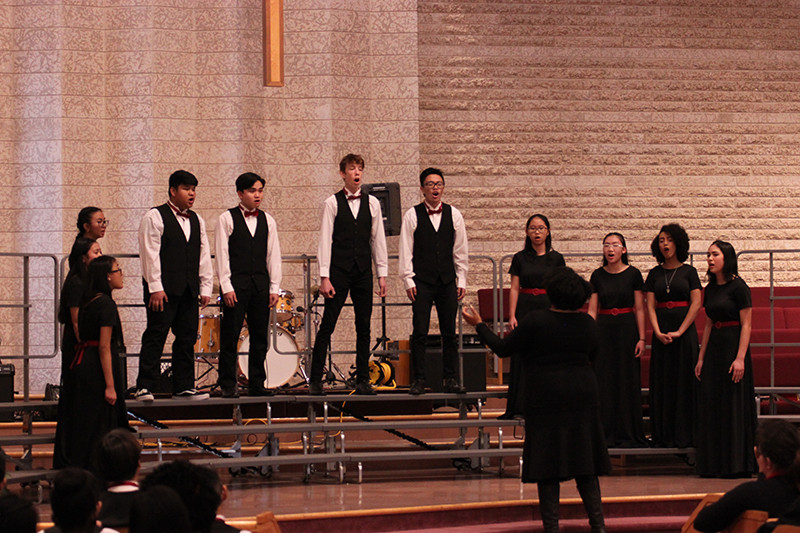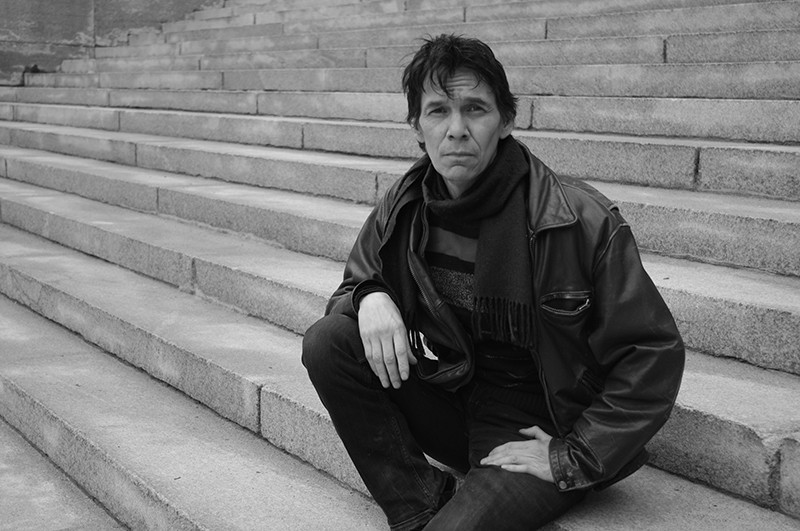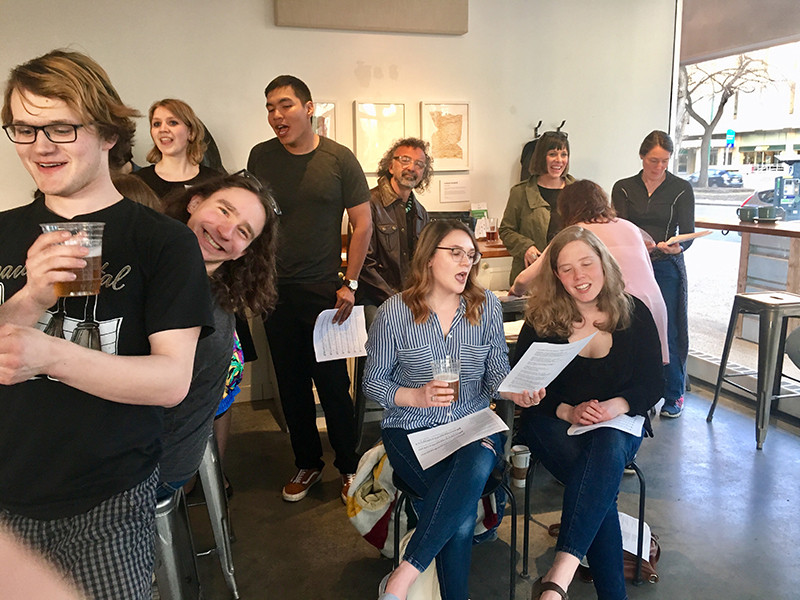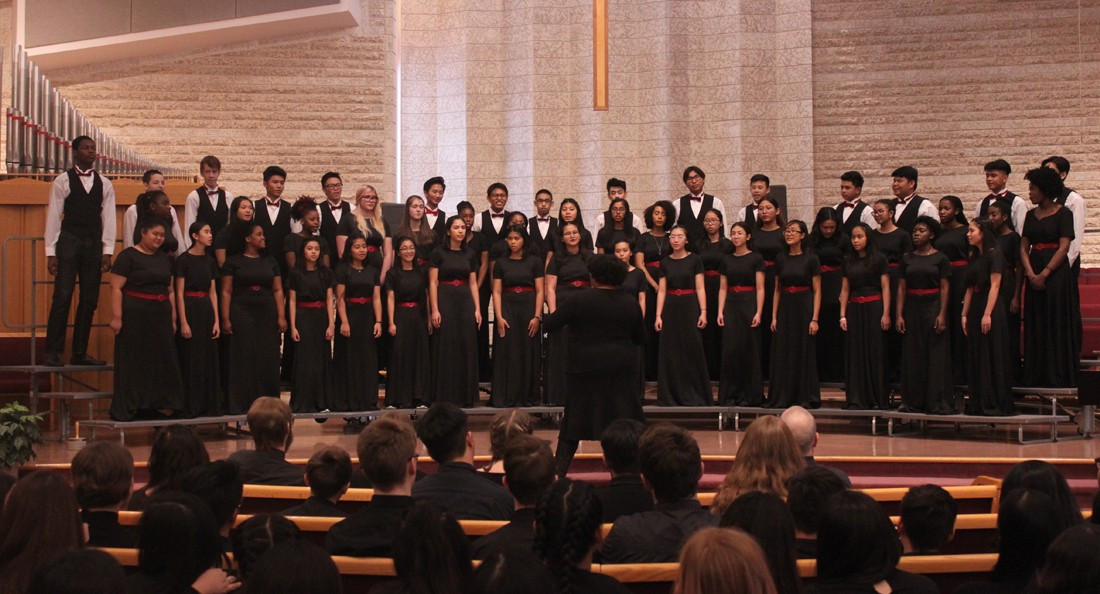Choir is love
Forging community through song
Humans primally express themselves with sound.
Where there is joy, there is a joyful noise. Where there is pain, there is wailing.
No matter where, every global culture holds a traditional musical language as specific and sophisticated as their spoken dialect.
Science shows that vocalization can leech stress from the body by lowering cortisol levels and producing oxytocin. A recent behavioural neuroscience study also found higher concentrations of endocannabinoids in subjects after singing, which benefit mental health, cognition and memory.
Just imagine what can happen when in a swarm of voices singing together.
Mind, body and spirit
Cynthia Peyson Wahl, singer and director of choirs at Daniel McIntyre Collegiate Institute, sees – and hears – great value in collaborative soundmaking.
“The whole body is involved in singing,” Peyson Wahl says.
When breath synchronizes, heartbeats synchronize, too.
Such intense co-ordination of physical and intellectual processes align groups of humans like flocks of birds or schools of fish. Consciousness becomes collective.
“(T)he community of singers together is of one mind or one heart, and the energy is positive, and they’re meaning to add a positive energy to the world – very few people get a chance to add beauty to the world,” Peyton Wahl says.

Peyton Wahl directs singers from the Daniel McIntyre choir.
“You don’t get to do that in math class.”
But what makes singing in a choir different from playing in an instrumental ensemble?
“We have text. It can help solidify the ideas we have about how we’re going to interact in the world, that point us towards goals we want to have as a community,” Peyson Wahl says.
To choose those texts, she collaborates with her Grade 12 singers.
“We talk about what matters to us and what is meaningful to us and what they see in the world.”
Each year, Peyton Wahl and her singers establish a theme. One year, it was community, and another year, social justice.
“Our theme for this year is love. We’re thinking about ways we can demonstrate love in our interactions with each other inside and outside the choir room,” Peyton Wahl says.
The music her choirs sing represents the cultural cornucopia of Daniel McIntyre’s student body to ensure all young people and their voices feel welcome in the room.
As an educator, Peyson Wahl’s endgame is to fill the world with conscious and empathetic humans through choral music.
“I think music allows us to explore feelings that are dangerous to explore, like anger and hatred and the depths of despair. Because we’ve felt that in a context that was safe, we can have empathy for others who are actively feeling those things. We can see, we can recognize that set of emotions.”
Peyson Wahl knows that exploring the depths of human emotion is a difficult thing to do – at any age.
“It’s not for the faint of heart,” Peyson Wahl says. “You need to make yourself deeply vulnerable, and you need to think about parts of your physical self that you never think about and then think about parts of your emotional self that you maybe don’t encounter in any other area of your life, and then you have to do it in front of a bunch of other people.”
But there is power in numbers.
“When you see a couple of leaders who feel safe doing it, it is contagious. When you can feel you can be brave in a moment, even if only one other person notices that, that might just give them the courage to be brave themselves another moment – and who knows who’s watching that?”
Good Vibrations
Andrew Balfour, composer and artistic director of Winnipeg’s Camerata Nova, has been a chorister as long as he can remember. He grew up singing at All Saints’ Anglican Church on Broadway, where his father was a priest.
Andrew Balfour is now a composer, but he discovered a love for music through choir.
He was one of the many Indigenous children pulled from their families during the decades of the Sixties Scoop. He feels he never had the religion pushed on him when he was young, but the music he sang in that church spoke to him.
“When I first started singing Bach as a kid, I realized that it was something special,” Balfour says.
“You don’t have to be Christian to be able to appreciate the music of Bach, Palestrina or Monteverdi. It’s going back to the sound – it’s vibrations. It’s that feeling of unity.”
The All Saints’ choir was one of exceptional calibre. Balfour recalls that their director was invective in demanding a pristine standard. Though the young singers would regularly be brought to tears, Balfour found comfort in his connection to the music, his fellow singers and his sense of belonging.
“I always wanted to play hockey, but I’m a slim and small guy. I never actually got a chance to play hockey, but I was in something that was like-minded.”
Balfour knew he was an essential part of something – something that could produce transcendent beauty.
“We were on a team. And it sounded amazing! When you do something really good and you really have great music, there’s nothing better than that.”
After dedicating many years to studying trumpet, he returned to singing in the early ’90s. It was the spatially resonant choral writing of contemporary Estonian composer Arvo Pärt that flipped the switch.
“It blew my mind.”
Balfour has composed a healthy catalogue of choral works over the last 20 years for a variety of ensembles in Winnipeg and beyond.
The music Balfour writes often carries deep personal significance. His first choral work was a four-part hymn to be sung at the wedding of a woman with whom he was deeply in love. A section of his more mature works are connected to his understanding and fortification of his Cree identity.
Most recently, he has been commissioned to compose for the Juno- and Grammy-nominated Toronto Mendelssohn Choir and the Grammy-winning vocal ensemble Roomful of Teeth.
No matter who is singing or what is being sung, Balfour marvels at the power of collaborative singing to open hearts and minds. Age, gender, creed, ideology and political leanings become inconsequential when swimming in sound.
“It’s so bizarre to walk into a room and see 140 singers and not know one person but still connect with them – be able to say to them, ‘Let’s make music. Let’s do something together.’”
Lubricated Larynges
Not all Winnipeg choirs, however, are about hard work and refined repertoire.
Co-directors of the city’s most well-lubricated casual choir, Katy Harmer and Ian Campbell, started the Winnipeg chapter of Beer Choir in September 2017.

A Winnipeg Beer Choir event.
They were inspired earlier that year by an event hosted by St. Louis-based choral director Michael Engelhardt at a choral directors’ conference in Minneapolis the pair had attended earlier that year.
“We started in September 2017 at Fools & Horses. That drew about 50-ish people. Our St. Patrick’s Day event there was overflowing. Most recently, we put on a sing-along Messiah in November with orchestra and soloists. We had about 180 people out to that event,” Campbell says.
“We’ve heard from so many people that have come to Beer Choir that they love how much fun it is and how it gets them singing without having to commit long-term to a choir,” Harmer adds.
Though a baroque masterwork like Handel’s Messiah might sound intimidating, there’s always a sprinkling of seasoned choristers upon which the less confident can lean.
Harmer and Campbell say the repertoire isn’t always so demanding. Even so, the pressure of perfection is tapped away with the kegs.
“We have a mix of new and returning folks every time. I think what happens is that someone brings their friends, and then next time, someone from that group brings their own people, and the word spreads. And we get a very wide age range, which is so great.”
Choristers at a Winnipeg Beer Choir event.
Harmer adds that the Winnipeg Beer Choir is a great place to meet new friends from all walks of life.
“There have been folks who arrived on their own but very quickly find a group to sit and sing. There’s nothing like singing to bring people together.”
Raise your voice
From the World Village Gospel Choir to the Rainbow Harmony Project, Riel Gentleman’s Choir and Red Sisterhood Singers to Women of Note and River City Sound (formerly Golden Chordsmen), the Prairie Voices family to Ecco and Sonolux, Renaissance Voices to the Winnipeg Glee Club, Les Intrépides to the O. Koshetz choir – these choirs only represent a fraction of Winnipeg’s community ensembles. There is a choir for anyone who wants to sing in Winnipeg – whatever their age, taste or skill level.
And it’s good for you!
“People have been singing together for eons. We all have a voice, an instrument right inside of us,” Harmer says. “There is something so fundamental about singing in a group. Even more than playing instruments, it feels like singing breaks down barriers and brings a group together.”
This is a call to all those who sing in their showers and cars, when they know they’re home alone, in the wilderness or only in their heads.
This is a call to be vulnerable together. To listen to one another. To be courageous for each other.
Choir is love.
Published in Volume 73, Number 16 of The Uniter (January 31, 2019)







